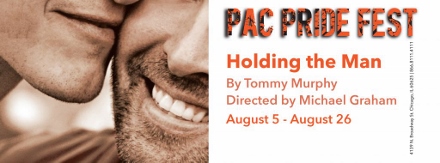HOLDING OUR ATTENTION
Playful and powerful, hilarious and anguished, Tommy Murphy’s Holding the Man is a 2006 drama based on an immensely successful 1995 memoir. The author was apprentice Australian actor Tim Conigrave, who died in 1995, as did his lover John Caleo in 1992, of AIDS. (The 2015 film version, starring Geoffrey Rush and Guy Pearce, is a favorite on Netflix.) Detailing their seminal and tested 15-year-relationship, Conigrave’s non-fiction testament covers a ton of territory, both emotional and cultural. However personal and detailed its fidelity to their liebestod, Holding the Man also chronicles the hedonistic disco days that followed Stonewall — and the infinitely unfair epidemic that so wrongly seemed to indict that sexual freedom.
In 150 engaging minutes, pop hits marking the swift-paced chronology, there’s never a false moment or an untrue emotion in this Pride Films and Plays’ Chicago premiere, exuberantly directed by Michael D. Graham (artistic director of Evanston’s Piccolo Theatre). Along with the lovers (Jude Hansen and Micah Kronlokken), Graham’s six-person ensemble — Cody Derricks, Alisha Fabbi, Mikey Gray, Bryson David Hoff, Alexander McRae, and Jordan Moore — fully flesh out a lost world from down under, reinventing everything from the inside out. The high energy that sustains this sweet, then sad, story never drops.
 This captivating life/love story — narrated by Tim (Kronlokken), an open-eyed dreamer with a heart and a half — begins with his “coming-of-age (and orientation)” teen years at Kostka, the preparatory school of the all-boys Catholic Xavier College in Melbourne. In this hothouse enclave Tim meets and adores John (Hansen), his once and future boyfriend.
This captivating life/love story — narrated by Tim (Kronlokken), an open-eyed dreamer with a heart and a half — begins with his “coming-of-age (and orientation)” teen years at Kostka, the preparatory school of the all-boys Catholic Xavier College in Melbourne. In this hothouse enclave Tim meets and adores John (Hansen), his once and future boyfriend.
The playwright is wonderful at conveying the full force of the first impressions of star-crossed lovers, beginning with the 1976 mash notes that Tim scrawls on John’s pencil case. We watch Tim’s tidal wave of infatuation, a crush that would only be threatened by Tim’s later infidelities and a disease from hell. Amid sympathetic “circle jerks” with friends (homophobia here is implicit at most) and some very explicit sex talk, this drama student falls hard for sweet-faced, soft-spoken John (“quiet, gentle and good at everything” and with “chocolate-brown eyes, an almost undetectable smile, and unbelievable eyelashes”). The ultimate opposite who attracts, John was a football star, school prefect, and science major (who would go on to become a chiropractor). Inevitably, the sports metaphor — “holding the man” — that John inspires is a strategy for love as much as rugby.
Their courtship is as much instinct as destiny, with their friends knowing their hearts before they do. (In a delightful party scene, the girls in their group “pass a kiss” around a circle so the guys can finally embrace.) When this self-reconciled “poofter” finally rings John up and asks “Will you go round with me?” it’s a whirlwind romance, just as the phrase promises.
Tim gleefully expounds on his activities with the colorful members of a campus gay group that runs a sex hotline. We see the boys’ tentative, sensitive exploration of the differences that define them and the passions — jealous as well as amorous — that bond them. The riptides — overcoming denial; breaking from the closet; parental disapproval; monogamous John’s anger over promiscuous Tim’s “experimentations” — keep every scene fresh and forceful. Almost danced out in an unstoppable delirium, the first act is pure euphoria.
In the second act, science (John’s medical studies), love (trial separations triggered by Tim’s infidelities), and art (Tim’s openly gay involvement in political theater, like his Soft Targets play about a new illness) collide with encroaching health challenges. Starting in 1990, John rapidly declines, inflicting egregious guilt in Tim over how his lover got infected.
To the un-bitter end neither the memoir nor Murphy pulls any punches: Among them are petty property disputes between John’s father and Tim over a sick son’s inheritance; John’s slurred but determined declarations of last lost love; and Tim’s own dying declaration (he outlived John by only three years): “I guess the hardest thing is having so much love for you and it somehow not being returned. I develop crushes all the time, but that is just a misdirected need for you. You are a hole in my life, a black hole. Anything I place there cannot be returned. I miss you terribly. Si vedremo lassu, angelo.” We can only hope he did.
Despite the sometimes exasperating Australian accents and jargon, it’s hard to imagine more truth, love, pain or joy on one stage in two hours. Hansen and Kronlokken delight and convince in all directions. It’s totally right that theater, its every essence transient and conditional, so eloquently echoes the equal evanescence of love and life. Sometimes it doesn’t matter a damn whether art imitates life or life returns the compliment.
photos by Paul Goyette
Holding the Man
Pride Films and Plays
The Broadway, Pride Arts Center, 4139 N. Broadway
Mon, Thurs & Sat at 7:30; Sun at 2; Tues at 7:30 (Aug. 7 & 21 only)
ends on August 26, 2018
for tickets, call 773.857.0222 or visit Pride Films and Plays
for more shows, visit Theatre in Chicago




